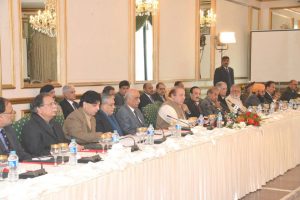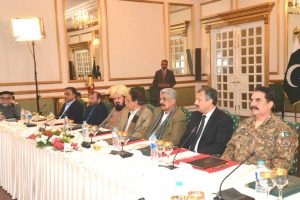Newspaper Article 01/01/2015
After a marathon meeting, national leadership approved a comprehensive plan of action against terrorism in a move described by Prime Minister Nawaz Sharif as a ‘defining moment’ in the fight against terrorism.  The 20-point National Action Plan that envisages establishment of special courts for speedy trial of proven terrorists and a crackdown on terrorists’ support structures is now undergoing strategy level strip down. A committee each has been formed for each point. In other words, now flesh and arteries are being woven into the skeleton provided by the Action Plan. Prime Minister is personally involved at micro level to see that all loopholes are well plugged. The speed is the hallmark of this entire activity. Matters that could have otherwise taken months are being finalized in hours.
The 20-point National Action Plan that envisages establishment of special courts for speedy trial of proven terrorists and a crackdown on terrorists’ support structures is now undergoing strategy level strip down. A committee each has been formed for each point. In other words, now flesh and arteries are being woven into the skeleton provided by the Action Plan. Prime Minister is personally involved at micro level to see that all loopholes are well plugged. The speed is the hallmark of this entire activity. Matters that could have otherwise taken months are being finalized in hours.
In his televised address, the prime minister said that the December 16 Peshawar school massacre has drawn a line between ‘coward’ terrorists and the Pakistani nation. “A line has been drawn. On one side are coward terrorists and on the other side stands the whole nation,” he said. “The Peshawar atrocity has changed Pakistan. We need to eradicate the mindset of terrorism to defeat extremism and sectarianism,” he said. “This horrendous attack has shaken the nation as the terrorists attacked the future of this country.” Elaborating the 20-point National Plan of Action, the prime minister said that execution of convicted terrorists will continue and special trial courts would be set up across the country for two years in order to ensure speedy trial of terror suspects.
Setting up of these courts was the main sticking point in the marathon meeting of the parliamentary parties as some important parties had genuine reservations about military courts. Now, an amendment will be made in the Pakistan Army Act 1952 for the establishment of these courts. The number of military courts will be according to the number of terrorists in a province.
Logistics and funding of terrorist outfits are an important aspect; lot of money flowing in under very noble banners is ending up in financing terrorism via sectarian organizations. While mobilization from domestic donations forms only a small fraction, major chunks come from some of the friendly countries for whom Pakistan is a battle ground for their proxy sectarian. It will be an uphill task to find ways and means to trace and choke such funding.
It would be naïve to view extremism and terrorism in Pakistan in isolation. Phenomenon shares causes and draws inspiration from what all is happening in Afghanistan and the Middle East. Political retrofitting of most of the Middle Eastern countries in the wake of Arab Spring did raise hopes in this part of the world also. Such hopes were irrelevant and oversimplification; so replication did not happen. Some countries, like Egypt, returned to status quo ante, thus dampening the hopes for their replication elsewhere. However, some countries like Iraq and Syria slipped in to a never ending anarchic situation and formation of principalities under various brands. This has once again raised the hopes of militants to follow that approach. Like the first approach, this one also has no scope for replication in South Asia. Nevertheless, caution is due to create adequate hedge through effective governance measures.
The consensus that Prime Minster has mobilized is conditional and time bound. If high profile terrorist activities continue, then the shaky consensus would meltdown. It does not take rocket science to restore law and order provided a feeling is radiated that anyone doing such acts will not be able to get away with it. This basically needs two steps: equality before law and tracking down the perpetrators of such acts beyond Pakistan’s borders and bringing them to justice. Fortunately, as of now, both these are achievable. If political considerations are kept apart, justice could be administered speedily and across the board. Moreover, unprecedented support from the Afghan government provides a chance of retrieving back the master minds residing in Afghanistan. Special operations remain an option should the willing support from Afghan government fizzle out.
Similarly, the National Plan of Action envisages registration and regulation of all Madaris. Interestingly, during the meeting of the parliamentary parties, almost all participants agreed with JUI-F Chief Maulana Fazlur Rehman that this issue should not be discussed as it would create uproar in the country. “First fight with terrorists, then focus on Madrassa reforms,” Fazl was quoted as saying in the meeting.
Action plan has unnecessarily broadened the scope of activity by including action against terrorists in Balochistan and Karachi, and militancy in Punjab. Though these issues need attention, mixing-up everything has inherent disadvantages: effort would dilute and adversely impact on the outcome; and chances of misuse of upcoming laws and judicial processes would increase. Government would do much better by not mixing the law and order situations with terrorism; even though there are linkages between these pockets of violence, each calls for a separate and specialized treatment.
In his remarks at the meeting of the parliamentary parties, the prime minister said, “This agreement is a defining moment for Pakistan. We will eliminate terrorists from this country. Our resolve to fight terror is a strong message for those who want to destroy Pakistan. Time for half-baked decisions is over. We agree that we have to implement it immediately”. However this consensus, which has under currents of conditionalities and limited time offer, has placed an enormous responsibility on the government. It should be cautious that in an attempt to appear doing everything, it may not miss out on core areas. Terrorist have to execute a high profile activity every 2-3 months to remain relevant, government has to be vigilant 24/7 to thwart this. Moreover, terrorist can fail in their attempts and still remain relevant; government does not have the luxury of failure.
Army chief General Raheel Sharif also briefed the participants about his meeting with the Afghan and ISAF commanders, who, he said, assured him of their full support in fighting militants . “Army has launched operations against terrorists and has killed 2,100 terrorists during Zarb-e-Azb and Khyber-I,” he added. Success in this kind of warfare cannot be measured quantitatively; rather, it is gauged qualitatively; not in the numbers of those killed but by the effects generated by those who still survive. Going by this criterion, our success over the years has been minuscule and diminishing.
. “Army has launched operations against terrorists and has killed 2,100 terrorists during Zarb-e-Azb and Khyber-I,” he added. Success in this kind of warfare cannot be measured quantitatively; rather, it is gauged qualitatively; not in the numbers of those killed but by the effects generated by those who still survive. Going by this criterion, our success over the years has been minuscule and diminishing.
Shortcomings of judiciary have yet again come to fore. Unpleasant decision of setting up military courts owes its genesis to failure of the judicial processes to finalize the cases within the time frame stipulated by the Anti-Terrorism Act 1997 and Protection of Pakistan Act 2014. According to Sub-section 7 of Section 19 of the ATA 1997, “the anti-terrorism court shall on taking cognizance of the case, proceed with the trial from day to day and shall decide the case within seven working days.”
In the wake of Peshawar tragedy, Chief Justice of Pakistan Nasirul Mulk chaired the meeting of the chief justices of all high courts and in-charge monitoring judges of high courts at the Supreme Court. He directed the participants of meeting and the anti-terrorism courts (ATCs) to conduct daily hearings as per the Anti-Terrorism Act (ATA) 1997 so as to ensure speedy disposal of terrorism-related cases. On perusal of reports received from the high court/ATCs, it came to fore that only 10-15% of cases pertained to bomb blasts/attacks by proscribed organizations/elements while the rest of the cases tried in these courts only technically fell within the definition of terrorism. Hence, there is a need to set our fundamentals right before we move to conquer terrorism—terrorism must be precisely defined.
The Nation, December 29, 2014.
Disclaimer: Views expressed are of the writer and are not necessarily reflective of IPRI polic

